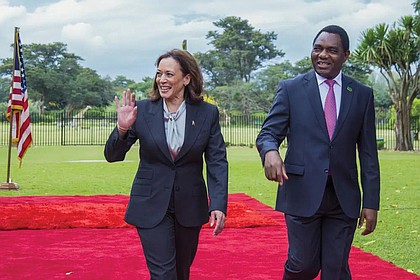The Kamala Harris I saw in Africa, by Errin Haines
4/27/2023, 6 p.m.
In many ways, Vice President Kamala Harris’ visit to Africa in late March and early April was not unlike her stops in cities across the United States: She made a pitch to communities, touted an administration policy backed with funding, and reaffirmed the White House’s commitment to an issue while acknowledging the work left undone.
But in every way, it was totally different.
It was a trip that played to Vice President Harris’ strengths, but not only as the first woman and Black American vice president visiting the continent for the first time in her historic role.
Many of her approaches to leadership were also on display: a focus on the future and tangible solutions; a style that seeks to educate without lecturing; a constant consideration for who isn’t or hasn’t been in the room or on the agenda; an aim to shape a narrative that seeks to challenge traditional thinking about seemingly intractable issues; and a premium placed on inclusion not just in who has a seat at the table, but who’s at the head of it.
There also was a chance to see how Vice President Harris’ lived experience has shaped her political career, particularly in Zambia, the one African country she had previously visited as a child. Her maternal grandfather, whom she has called one of her biggest inspirations, and aunt both worked in Lusaka, and she visited them as a young girl. Returning as the second most powerful person in American politics felt like a full-circle moment, and she was embraced by Zambia’s leadership and citizens.
In the United States, Vice President Harris has faced constant criticism, with detractors saying she has had trouble defining herself and has been ineffective. As with many firsts, she was covered more in the process of making history than she has been actually doing the job. Americans in general rarely think of the vice president as someone with real power or influence.
But in Ghana, Tanzania, and Zambia, the countries’ leaders and citizens in their capitals expressed hope about what her visit represented. They welcomed Vice President Harris as the highest-profile representative of the world’s most powerful democracy and economy, with an expectation that she — and by extension, America — could improve their lives. Largely absent was the scrutiny and scorn that have stalked her from the right or the whispers about her political future from the left.
Back home, Vice President Harris’ historic weeklong visit was overshadowed by domestic events, but in Africa, it dominated local markets. African media far outnumbered the American press traveling with her at every stop. And along nearly every motorcade route, Ghanaians, Tanzanians and Zambians of all ages and gen- ders lined the streets. Whether they were smiling, waving, looking on skeptically or curiously, or filming her passing by on their cell phones, what was clear is that they wanted to see her. Many Black Americans have told me they want to see more of her, too, just doing the job, whatever it is on any given day.
Vice President Harris’ trip to Africa was months in the making, with a focus not on what the United States could do for Africa, but what the administration could do with the continent, a theme she repeated last week. She also touted two statistics repeatedly: that the median age on the continent is19,andthatby2050,1in4 people on the planet will live in Africa.
From a community recording studio in Ghana, to a small-business incubator in Tanzania, to a farm seeking solutions to mitigate the effects of climate change in Zambia, the itinerary attempted to showcase an emerging, innovative Africa in a way that didn’t use stale language or thinking and wasn’t focused on poverty or health crises. Vice President Harris also sought to elevate the conversation in a way that put Africa on par with Europe in terms of respect.
Jane Munga, a researcher at the Carnegie Endowment for International Peace focused on socioeconomic transformation and how the digital economy is contributing to that in Africa, said Vice President Harris’ trip further advanced a reorientation of how the United States is engaging with the continent.
“We’ve seen a change,” said Ms. Munga, a native of Kenya who is based in Washington. “They’re moving away from aid to trade.”
Vice President Harris’ connection as a member of the African diaspora and a woman leader also made her an effective messenger, Ms. Munga said, given women’s lack of equal participation in the digital economy. Continued engagement on that and other areas where women are disproportionately affected will be the measure of success, she said.
In Accra, thousands cheered Vice President Harris during a major speech at Black Star Gate — a monument celebrating the country gaining independence in 1957 — when she discussed equality for women: “Let us agree: Women around the world must be able to fully participate in economic, political and social life. And they must be able to participate equally, including in leadership roles. It is a key to maximizing global growth and opportunity.”
Glynda Carr of Higher Heights, which endorsed Harris for vice president, was in the audience as part of a group of Black American leaders invited to join Harris on her Ghana visit. She described the experience as “significant,” one that spotlighted the power of the diaspora and that will be looked back upon as a history-making moment.
“If we’re questioning Kamala Harris and her legacy, that was, bar none, the example of her standing and living in her identity at the intersection of race and gender that will translate across the globe.”
In welcoming Vice President Harris to Zambia at a joint news conference Friday, President Hakainde Hichilema said her visit for many Zambians was like “receiving somewhat of a daughter of our country, someone who spent time here.”
Vice President Harris’ connection to Zambia in particular was apparent from almost the moment she arrived. As in other countries, she was welcomed by a delegation of local and national leaders and enthusiastic performers, but it was another group that caught her eye on the Friday afternoon we landed in Lusaka: the scores of cheering women waving American and Zambian flags and chanting her name.
The writer is an editor-at-large for The 19th. This commentary first appeared in The Amendment, a new biweekly newsletter by Errin Haines. To read the full commentary, please visit
https://19thnews.org/2023/04/the-amendment-errin-haines-kamala-harris-africa/








